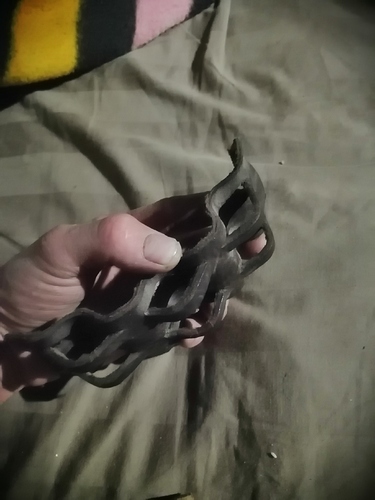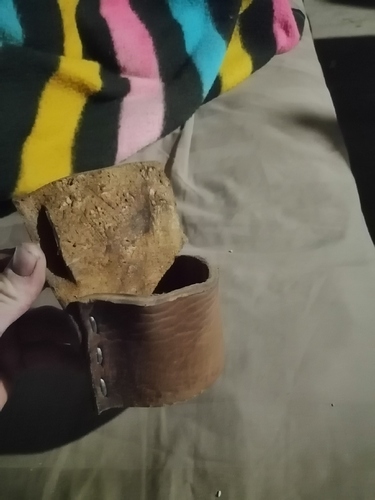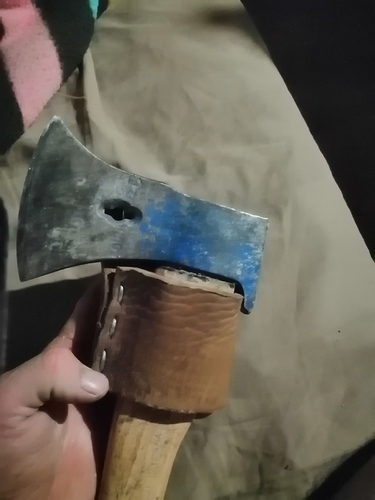Hi Jakob, Please build a guard around the flywheel, and drive shaft. These chunkers pull left, and right depending on the shape of the wood.
I was asked to post this newsletter on DOW. So, as promised.
Hello to everyone from ADAPTech. We are happy to report our safe return to North America from southern Africa. We had a very eventful trip, full of stories of trials and difficulties, but it was also quite successful. So many things happened that I am afraid we will never be able to list them all here, but we will do the best we can.
Luke, Naomi, and I left Alabama on September 9 and arrived in Lusaka, Zambia, on September 11, with “Mama”, a representative of our affiliate organization in Congo. (For security and reasons, we are trying not to publish the names of the organization and people we are working with in Congo. It can be a dangerous place to work.) As usual, the travel was quite taxing, especially for me who had back surgery just 7 weeks before we left. I was quite concerned about my back for much of the trip, but the Lord is faithful and it did not pose any unexpected problems. In fact, I experienced significant healing and increased health in Africa.
After a day in Lusaka we spent the next day on a bus for 14 hours to another city, then waited another day for our cargo to catch up to us. A significant amount of tools & equipment, fuel & oil, and building materials had been bought in Lusaka for the organization’s development project activities. We hired a Toyota “taxi” to take us to the next city along the border of Zambia and Congo, which is where things took a turn. We had expected to cross the border the day after arriving, but we were informed that the border had been closed. We were eventually told that some people on the Congolese side were harassing, kidnapping, beating, and raping Zambian farmers when they crossed the border to farm crops in the better Congolese soil. The problem there has resulted from the division of traditional tribal lands by the imposition of artificial boundaries by European governments long ago. The Zambian officials had attempted to meet with the Congolese leaders and chiefs to deal with the matter, but were ignored, so they closed the border in the entire province. Local politicians kept telling us to be patient and they would get us across, but eventually we found out that the order had come from President Lungu himself, so no one would even ask for a bribe to let us across. Much could be said about our time in the dusty, hungry town of Kaputa, but let us leave it with this; we sat there for 14 days waiting for one dysfunctional system to accommodate an even more dysfunctional one. I think we ate fish & nshima 19 times in 17 days. In the meantime, “Mama” got a bad case of malaria and had high fever, so when we finally made a plan to pursue other options, she was very sick.
Nevertheless, we finally made a plan which involved one of the most incredible spectacles I have ever witnessed. We had to travel to the neighboring province which had an open border crossing. It would be similar to arriving at the Canadian border in North Dakota and being told that in order to cross you had to go to Wisconsin, cross there, and then travel back to your destination on the Canadian side…except with no roads on the Canadian side. The first part of that trip took us a long day in a truck across the worst roads I have seen so far in Africa. By the time we arrived in Nsumbu, I literally and seriously considered that I might have busted a gut during the trip. The next day, we met the men of the development organization who had traveled 87 miles cross country on 56 bicycles and 3 motor cycles to meet us on the shores of Lake Tanganyika. When they arrived to meet us, they cooked a meal of ugali to add to the hard-boiled eggs that Luke had brought for them. (He spent a day and a night cooking 10 dozen eggs in an electric coffee pot so the men of would have some protein for the trip.) Then the men loaded 57 bicycles (one we had bought) with almost 5,000 pounds of cargo we had brought and began the long walk back over the mountains. I have never seen anything like it.
We four went with two other motorcycle drivers and headed out on the motorbikes toward our final destination. Our travel took us about 90 miles cross country in the back woods bush of northern Zambia and southern Congo. We passed through small mud-hut villages where people had never seen white people. Some were scared of us while most were curious. The immigration office near the border that we passed through was a small thatch roof mud hut, about 7 feet across and 5 feet tall. An interesting thing happened that taught us some lessons about being very careful how we handle ourselves. After many hours riding double and with luggage on motorbikes on hard trails full of sand pits, slime pits, stumps, vines and boulders we were somewhat stiff when we arrived at the immigration office and in need of stretching. My son Luke, who is taller than 6 feet, needed to stretch his back and legs, but sitting on a small bench in a short building made this rather difficult. In order to make the necessary movements he needed to move in some awkward positions while we sat in the building to get our documents checked. This ultimately put him in the accidental position of kneeling on the floor in front of the immigration officer. Since we were the only non-Zambian/Congolese people to ever pass through this office or village, the local people were quite interested in us. Several hundred were crowded around the hut looking in to see the white ghosts and pulling Naomi’s long hair. When Luke knelt down to stretch, an old woman looking in mistook his action as worship and got very excited. She hurriedly began chasing all the children away from the scene. “Mama” was quick to recognize what was happening and was able to quickly diffuse the situation before it became damaging to our testimony in that place. I was grateful to her for that. It is always amazing how quickly such “offenses” can happen. We need always to remain diligent that we do not accidentally damage our witness or bring shame to the cause of Christ.
After the border crossing, it got dark. That’s when driving the motorbike got really interesting. We traveled through very hard country on trails that were often no more than 10 inches wide. We hit trees and rocks and slime pits. This was exceptionally taxing and tiresome, but what best describes it was something that Naomi (riding behind me as I drove) said as we were crashing through the bush. “This is the most nerve racking and coolest thing I have ever done.” I have to share the sentiment. We and other riders found ourselves laying in the sand pits on several occasions through the night. In one particular slime pit that Naomi and I landed in, I was very happy to be wearing a helmet. If I had not, the rock which broke the helmet would have prevented me from writing this story to you. In fact, it would very likely have scrambled my brain.
The men pushing the bikes had it much harder than us though. They left Nsumbu the same time that we did. We arrived in camp at about 10:30 PM to a huge welcome from the women and few older men who could not make the trip. But the men with the cargo remained on the road pushing those bicycles across those 87 miles over mountains and through the same sand and slime pits. I did not really sleep that second night. As the thunder and lightning crashed during the storm that came through, I just laid there thinking about the men on the trail. I have never been more thankful for a dry, mediocre mattress. They arrived in camp 60 hours later, very tired from the trip, yet full of excitement for what events our time there might bring.
After some sugar cane and a few hours sleep they were up the next morning early, ready to begin. “Mama” had a significant amount of programming to deliver in addition to our subject matter, and she was still very sick, so our beginning there was hindered and slow, as she was our primary translator. Nevertheless, we were there to accomplish something, so we got to work and were soon accomplishing our tasks. Classes were happening and work was being done. We ended up extending our airline travels so we could make up for the time we lost in Kaputa, and our time in the camp with the people of the project was, as expected, a great blessing to us all. The people there are still very dedicated and devoted as they were when last we saw them. They have expanded their agriculture several times over. There are now 2 fish ponds full of tilapia, from which we had several meals. Fruit is beginning to produce there as well. While we were there, they prepared planting space for a grove of trees from which they can make their table salt. The guest quarters were expanded so there is now a second house and bathhouse. We brought floor tiles to finish the prayer house. Also, while we were there, they built a men’s dormitory and finished a large store room. After seeing one of our training videos they decided to add an underground root cellar for vegetable storage. I was encouraged to see that they have begun to build with natural stone. There is an abundance of it there, and moving to this as a primary building material could save much in the way of wasted labor and fuel to fire bricks. The general health of the members seems to be increasing slowly as the general health of the rest of the town around them seems to be decreasing. The agriculture and nutrition programs are having a noticeable effect on the well-being of the people. They have a long way to go, but they are going.
A men’s group at a church here in Alabama donated funds for a chainsaw mill project. We were able to purchase and transport all the equipment, fuel, oil and safety gear for a functional sawmill project. Much of my time there was spent dealing with the introduction of such an advanced piece of motorized technology. Up until now they have been felling trees with homemade axes and milling lumber with a two-man rip saw. It is unbelievably difficult work. It costs them huge amounts of food energy that they do not have to spend. However, dissemination of new technology is always a tricky thing in development situations. Much damage can be done by doing it the wrong way or at the wrong time. Introducing a deadly piece of equipment to a people that have few machines was a serious matter and we treated it as such. Much time was spent in classes teaching and practicing safety and maintenance subjects. We had even taken a great series of videos dealing with everything to do with using a chainsaw. Committees were established to govern the use of the equipment, maintain the inventory of tools and supplies of fuel and oil. Maintenance personnel were assigned and trained, and a stone bunker was built to house the equipment. We also taught classes on wildlife and environmental management and protection from a Biblical perspective. Eventually we got around to actually using the saw to fell and mill trees. The effectual use of the saw was a bit slow at coming in the beginning. The men there are small by stature so it usually took two of them to lift and use the saw effectively. And perhaps I over did it on safety training and pictures of people who had cut off their face or arms with a chainsaw, because the students were very nervous about hurting the equipment and themselves. This hindered their progress for about a week, but then they seemed to take ownership of the situation and it all took off. One early morning they came and took the saw before I even awoke. Throughout the
day I would hear the saw in the distance. Though I found it very difficult, I fought off the urge to go check on them throughout the day. I could tell what stage of each process they were at by the sound of the saw. Finally, at the end of the day, they had milled a large log very well. They had made a couple of mistakes and learned a couple of lessons, but they had finally taken ownership of THEIR project. After that, it became theirs and I no longer needed to be with them all the time. They would simply come to me to get direction and learn new things and to ask questions, or to get help fixing what they broke. They learned how to make new chains and how to sharpen old ones, how to fell trees and to turn them into lumber. The saw broke and we fixed it. The mill broke several times through the learning process, and we rigged it back together with the resources at hand. It was a very successful project. Much of the lumber was used as soon as it was milled to build the new men’s dormitory.
We also taught auto mechanics using the truck that had been broken down there since last year. Thanks to some ADAPTech donors who provided funding, a very friendly Toyota dealer in South Africa, and one of our former students, Pastor Bruce in Lusaka, Zambia, we were able to identify the parts we needed, locate each one in Lusaka, send the money ahead by wire, and have them available when we passed through on our way to Congo. I was amazed that we were able to coordinate so many steps in the process just to get a clutch disk and a few other parts to a particular place in the woods in DR Congo to fix a truck. International phone calls, internet communications, a friend driving around the city several times to find each part, meeting us to deliver them, bus rides, taxis, trucks, border crossings and import duties, cross country on motorcycle and bicycles……………I operate a mechanic business here in Alabama. Two days ago, I clicked three buttons on my computer to order a new radiator for a truck. Yesterday it arrived on my front porch by way of the UPS delivery man, and I installed the radiator and returned the vehicle to its owner. The payment for the part was automatically deducted electronically from my account and I will not even think of it again. The contrast is amazing, and highlights some of the reasons why it is so often much harder than we think to overcome poverty. There are stacks of layers of piles of systemic obstacles for people to overcome. There are usually no easy solutions. The majority of the poor of the world are not lazy people. In fact, most of the really poor people I know can (and daily do) work circles around most of the rich people I know.
Nevertheless, I was surprised how fast my class was able to replace the clutch disk and other parts considering how few tools we had to work with. We were able to get it running well and used the truck a few times to go into town to make use of the phone system there to call home and to haul supplies.
We took enough audio-visual equipment to be able to show videos at night for the people there. We had made quite a few training videos before we went, to introduce different ideas to the people of the project in an attempt to get ideas flowing. Wood gas trucks and Jakob’s other homemade machinery seemed to be the favorites, but they also enjoyed videos about canning and food preservation, food drying, chicken tractors, black smith technology, auto mechanics and similar subjects. My 10-year-old son Jesse was a great blessing in his role as editor. He has become quite capable in that role here at ADAPTech.
Luke is a very qualified bee keeper. His main practical objective for the trip was to evaluate the possibility of starting a bee project there for nutrition and small industry. He taught a few classes on the subject and explored the area to look for resources and bees. They were able to find and capture two varieties of bees. One is a very rare sting-less type which seems to make good honey. The other is quite aggressive and doesn’t seem to have much honey at the end of dry season. We relearned an old lesson about listening to the locals when it comes to local information. Several students from Luke’s bee class helped him to recover some bee products from a hollow tree. As the products were collected, they put them on a plate and passed it down to the ground. We had different piles of honey comb and wax, brood and propolis. On the ground, some of us were eating some of the honey and comb. Luke and I were chewing on some chunks of waxy propolis we had found. It was beginning to get dark, so
they did not notice at first what we were doing. When they saw us chewing the substance, they got very excited and told us not to chew it. We told them that we do this all the time at home. It is good for your teeth and had some healing properties. They insisted, so we relented and decided that they might know something we don’t. Sure enough, they knew what they were saying. It turns out that certain parts of the products from this type of bee contain a mild hallucinogenic, and the effect on humans of other parts is similar to marijuana. So, we learned our lesson about listening to the locals when they get excited. Long story short…When we got back to camp, Luke, afraid to be caught on camera in an intoxicated state, quickly completed his evening tasks and went to bed to sleep it off. I, on the other hand, had a peaceful evening sitting on the porch watching the world turn.
Naomi also had great success in her mission there. She had a class of 7 women and girls to whom she taught the art of crochet. She showed them how to make toy animals, hand bags, blankets and clothes out of different types of string and materials. One popular item was a hand bag made from plastic bags that had been cut into strips and then crocheted together to make the bag. The class learned quickly, and before we left, I was told they had already received some orders for crochet projects for sale. We have received pictures that they have now completed entire outfits using the technique.
We also taught classes on nutrition, sociology, and wildlife preservation. On weekends I taught the youth lessons in geography and physics using common tasks like carrying buckets of water and moving logs through the woods.
Our time there was very rewarding for us, and I believe, helpful to them. There were many tears when we parted.
Eventually it came time to leave for home. We started getting ready to leave on a Tuesday. We took inventory of the equipment and clothes and tools left behind for future trips. We said goodbye and made videos of greetings sent home to Mama Erika. That day there was also a feast. We had a big pan of goat tongue, liver and kidney and fried cabbage. Naomi and “Mama” did a very good sociology class for the whole of the community who were all present for the event using an impromptu skit they had developed a few days before. The objective was to teach the origin of some of the cultural standards that are preventing development in Congo. Naomi played the overbearing European girl using her exceptional British accent (she can’t do a French Belgian accent), while “Mama” played the African maid trying to please the un-please-able. It was very good and quite funny actually.
The next day was supposed to be somewhat restful as we finished preparing to leave early the following day. But as is usually the case, plans don’t tend to work out. About mid-morning I looked out the window of my room to see a vehicle driving very fast up the drive to our house. That seemed very strange since there have only been 5 vehicles ever on that road, and I was in three of them. They came very fast and stopped quickly. Luke and Naomi happened to be in my room at the time. As the truck approached, the ladies in our kitchen ran away to hide in the bush. Soldiers with machine guns jumped out of the truck and ran across the yard. People were yelling. It was loud and nerve racking. We began to hide our money and valuables and to find our legal documents. Two well dressed, heavier men were telling Mzumbwe, one of our dear friends, and one of the motorcycle drivers of the project, to bring out the Wa Mzungu (white people). He was refusing to do so and saying he wanted to get “Mama” first; she happened to be deep in the woods at the moment. Soon after that, the Captain of the soldiers was looking toward my room and saw me looking through the window. He yelled, “There they are”, as he pointed at me. Then he ordered his men to surround our house with their AK47’s so we could not escape.
I grew up at a missionary school in Alabama. I listened since I was a boy to stories told by Grandma Sarah (Corson) and my mentor Benjo Paredes. When I lived and worked in Bolivia with Benjo I heard stories of how they were captured and tortured by revolutionaries for their faith and work with the poor. Always, growing up, whenever we had a new group of people at the camp, Sarah would tell stories of her life on the mission field. Lessons learned from real experiences with real people and their suffering. She has many books in which you can read the stories for yourself. My favorite story as a boy was “the soldier story”. She would tell how Nazi-trained revolutionaries mistook their work team in Bolivia for being communist enemies trying to stop their revolution. And how they had come in the middle of the night and surrounded the house with AK47’s and orders to kill all the men and rape all the women. I listened to how the men were taken hostage and imprisoned and tortured in a city dungeon, and also how Sarah showed them the true love of Christ when she volunteered to be killed slowly with a machete instead of being shot quickly so she could prove to her attackers that she could die while still loving them. There is a lot more to the story, but in those few minutes, as all of this was playing out
in a country recently destroyed by war; a place where the borders are closed because of corruption and abuse by ineffective government officials, that story came flooding back to me. Not the way it did when I was a boy, anxious to hear about the excitement and adventure of boldly facing down machine guns with a Bible and a willingness to suffer. And it was not at all a matter of fear. The fact is, my son and my daughter and myself have all been converted. We know the Lord and if He would call us home, I could handle that. The thing that was most pressing on my mind in those few moments can be understood in the few words I prayed in the very few moments I had to process it all: “Lord, don’t let me mess this up.” I recognized this as an opportunity and I did not want to fail at responding properly. Everyone always says that you can’t know how you will respond in such a situation until it happens. I suppose that may be true, but I believe that as we are transformed by the renewing of our minds, we train ourselves for such situations. I determined that I would not respond violently, but trust the Lord and respond as He taught. I hid my big knife under the bed so the soldiers could not be intimidated by it. My intention was to hide Naomi behind my bed in case they didn’t know she was there, and then make contact with the soldiers. Luke was in the process of delivering a camera battery when the truck arrived, so our plan was for him to leave the room with the battery and continue that mission and possibly get a message to “Mama” to return to the camp. Before Luke stepped out, we looked at each other. I said, “Stay Faithful.” He simply, and sincerely responded, “I will”, and slipped out the door. I watched for a second as he left the porch. One of the soldiers began pointing and shouting to inform the others that he was getting away. Mzumbwe set out to convince them that he was not trying to escape. The soldier that was yelling un-slung his rifle and seemed very excited that Luke was escaping the scene. I left the room to insert myself into the middle of the crowd of soldiers and tried to make a lot of noise in the process. I hoped to distract them from paying attention to Luke. The tactic worked and everyone’s attention turned to me. Once they realized that I was not running away, they seemed to calm down a bit. Several of the leaders of the organization there started arriving from the lower camp and attempting to make contact with the men. It was very stressful for several minutes while the soldiers and officials calmed down and were finally willing to sit and wait for the others to arrive.
Things could have gone quite a bit differently. Obviously, we did not die that day. The men and soldiers there were quite frigid toward us. Eventually, “Mama” arrived from the woods. The soldiers were very concerned about a video camera that was sitting nearby, so we removed it. When “Mama” arrived, we were all called into an interrogation with the officials and army officers. They inspected our documents thoroughly and scrutinized every word repeatedly. They lectured us for what seemed like hours. All the while “Mama” kept responding, “yes, but…”. She did a very good job of diffusing the situation. I would likely have not done as well. Luke was still recovering from malaria at the time, so he had a difficult time staying awake. Eventually, they told us why they were there. It turned out that a jealous enemy of the work there and a disgruntled immigration officer who did not get his “deserved” payment when we crossed the border in another place, had told the federal officials that there were 4 Americans mistreating the people and using them as slave labor to extract gold. They had come with that understanding and had acted accordingly. Eventually they calmed down enough to let us tell them what we were actually doing there and we eventually gave them a tour. We showed them the different technology models we had built like the new sawdust brick stove, rocket stoves, solar cookers, clay
pots, information about bee keeping and nutrition, and a rat trap we had made for the kitchen which happened to be sitting close by. As they ate our lunch, they watched some of our training videos about wood gas trucks and micro industry and the like. By the time they left, they were very friendly and convinced that they had acted too soon on the lies they had been told. The fact that I had been in the American army was of great interest to the army soldiers and allowed me to talk to some of them about the love of Christ as much as our linguistic differences would allow. Finally, when they left, one of them said he would like to return to that place to visit when he has leave. They were all convinced that the reports they had gotten were complete lies. Just a few days ago we received a message that two of the men in that group had been imprisoned for their conduct that day, and others had been called to the capital city to be interrogated.
The “invasion” set us back in our schedule, but we were able to leave the next day for the lake on motorcycles. The border was still not open. In fact, as I understand it, the border is still not open today. We made our way back across the back country to Nsumbu. The next day we took a boat across the longest and second most voluminous lake in the world, Lake Tanganyika, to the town of Mpulungu. From there we were able to get an 18-hour bus to Lusaka. A day there resting at the air-conditioned shopping mall, eating ice cream and even some very bad KFC, and we were able to get on a plane and head home.
The trip was a very hard and very good one. I did not have room here to tell you of all the things that happened. Motorcycle wrecks, cobras, surgeries, auto accident, iguanas in the toilet, malaria, two weeks of salt water, pygmy neighbors sneaking around our camp at night to hunt animals in our back yard, being “arrested” (detained) by the police, or even Luke’s pair of ducks. But maybe another time. Suffice it to say that it was a very hard but rewarding trip. Despite quite a few set backs, we were able to accomplish our objectives.
ADAPTech activities have been dominated by the Africa trip lately, but we have done a few other trainings while some of us were gone. Also, Jakob has continued development of the new style of wood gasifier and also built another wood gas truck. He has also begun yet another new stainless steel version of a gasifier for another truck in which he hopes to criss-cross North America; Atlantic to Pacific and Gulf of Mexico to Canada. Both Jakob and Luke are starting college in January so everyday life around here is likely to change a bit. We are now looking into planning activities for next year and getting back into the swing of things here at home. We hope to build a large mechanic shop for making money and training others, so we are beginning to mill lumber for that project. We are looking again at the Plastic-to-diesel project as well as a fish project. The organization in Congo has been asking for training to make clay roof tiles, and we are making some plans to research a stationary, earthen wood gas system to fire them.
Lots to do, as always. We continue to covet your prayers and support in our efforts. I would especially ask you to pray for me as I continue to recover from surgery. I am still experiencing foot and leg pain from nerve damage.
Thanks to you all, and as always, until next time, Go Do Some Good. Billy
adaptechmission.org
ADAPTech
4008 Co Rd #113
Lineville, AL 36266
Thanks for posting Billy .
Real glad yall are home and safe .
Thank you for your story.
You do a good job.
Very impressive, Billy!
Sets things in perspective. I will try not to complain again about darkness, snow and nightshifts at the paper mill.
I admire your devotion, but at the same time I feel like giving you a reprimand for bringing your kids.
I’m glad you’re all home and safe.
Thanks for posting your your congo / zambia south africa travel experiance. You are truely a famley of great faith too travel in such remolt areas of south africa. Sounds like you experiance way more than expected, The Lord Was With You. I will pray that your tramatic experiance dont keep you from returning faithfully.By next visit you might not get too take the back trails with out any anti snake ventom though.??
Thank you for the great story. So glad it had a happy ending
You are truly making an improvement in the world
Fantastic story, I’m happy that you share it with us!
Hope you get better, I send my prayers.
This is Billy,…
Well, let’s hope we’re making an improvement in the world. JO, there is a guy here in the US called MIke Rowe. The dirty jobs guy. After his experience of doing every job in America for more than 10 years, He has a saying about safety. He says, what if it is really not safety first, what if it is actually safety third. Safety is important, but probably not as important as the experience. I’m not looking to make things like that happen, but it’s always a balancing act to weigh the cost/benefit. I guess out there in much of the rest of the world, the threshold is a bit different. For example, Here I wouldn’t think of letting my son ride on the roof of a cross country bus. Over there it’s just the way of life…And JO, in my estimation you have plenty to complain about up there in polar bear country. My Months in Africa has nothing on you Swedcicles for toughness.
It got a bit cold down here and has been freezing the last several days.
I’m sure Wayne will agree with us over here that we are concerned that the cold doesn’t hurt our rattlesnake population.
Thanks to all for the support.
Billy, I agree safety issues have reached close to rediculous levels. Especially in work places.
I’ve ridden a couple bus roofs in my life, but bringing your kids to where you risk being surrounded by hostile AK47s is what made my jaw drop.
Sorry about the cold. I hope you get some snow to go with it. It’s good insulation 
yeah, I wasn’t really expecting the AK’s . That was more than I had bargained for.
No snow. Just cold mud. Poor snakes…
Luke and Dad have been making charcoal for a few days now. Luke and dad did most of the work but Luke was not around for the picture.
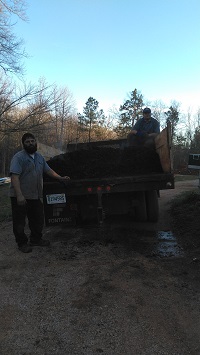
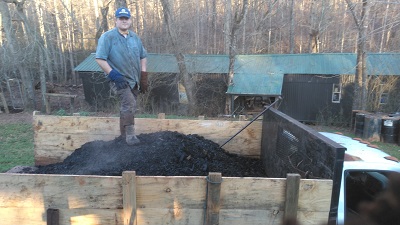
We also moved one of our little buildings I took a few pictures while following with the skid steer.
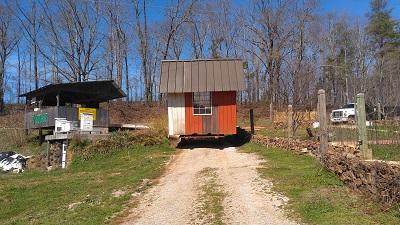
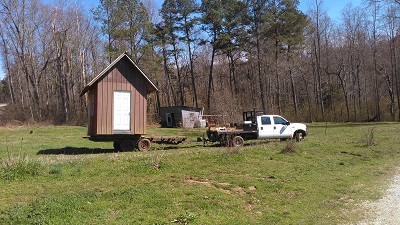
While being out of school we have been able to get more done around here. We have quarantined our self to home so lots of time to get work done. We are working on finishing the mechanic shop and transferring the tools from the little project shop. We also installed the lift. 


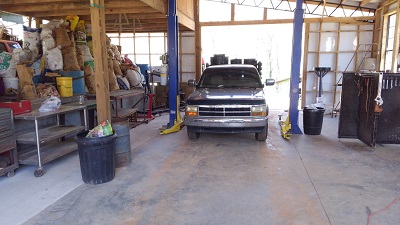
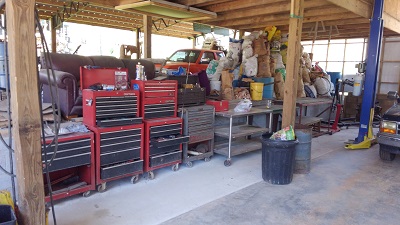
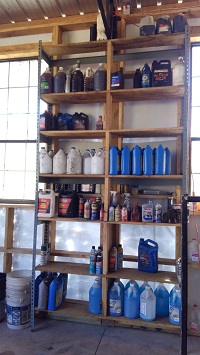
Getting the metal to finish the walls on the shop.
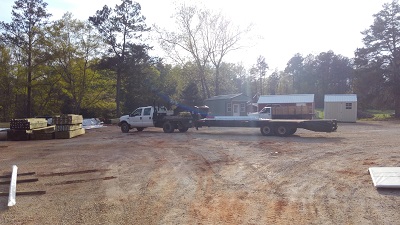
Jesse snapped a few pictures of me finishing the hoist I was cutting a hole for the bolt to stop the trolley.
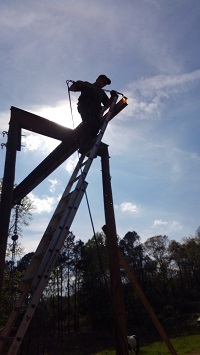
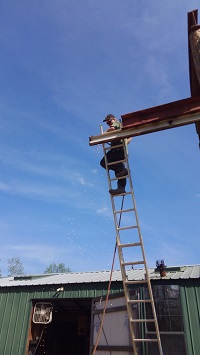
With the grass so green we have been letting the horse just roam around the yard and eat where he wants to. He never has tried to leave and the gardens are just getting going so he leaves them alone.
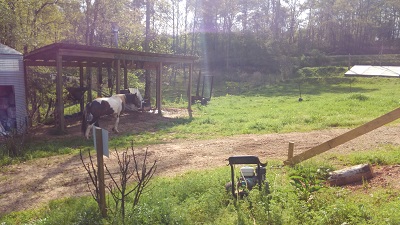
I spent today playing in the shop. The maple we have been getting is coming in handy for little projects like this. 


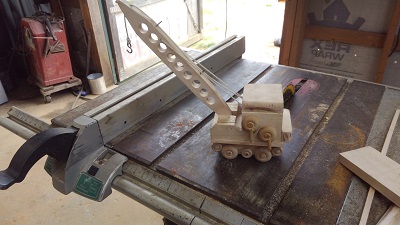
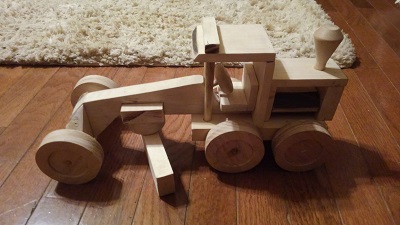
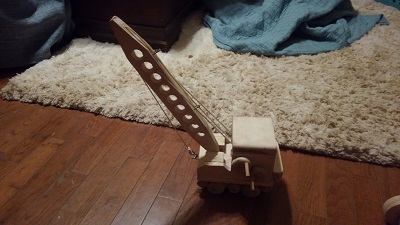
Jakob, are you expecting? 
Ha Ha.
No, I just enjoy making the toys and they make great birthday presents.
Here are a few more I made a couple years ago. Also a gun rack and Naomi’s woodgas truck. 

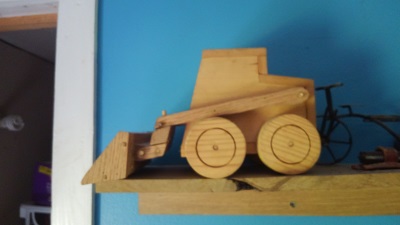
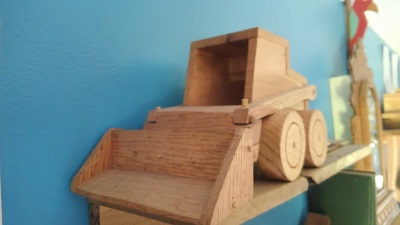
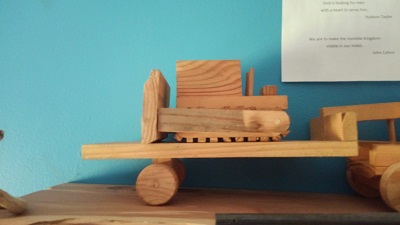
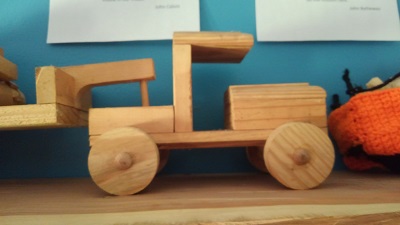
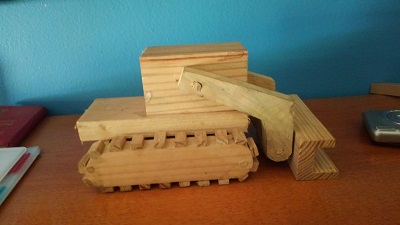
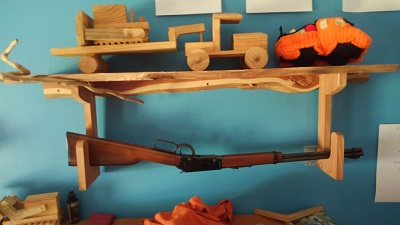
Jacob,
Are these your own designs?
Jacob, but you’re a good artist, a hat down.
I too made a few toys at your age or a bit younger (l am the oldest brother) but none compares to yours. Nice job.
I totaly understand you. I too get sudden urges to craft something. I dont have much spare time now but for some reason nowdays it sometimes grabs me to do leather works. Just a few examples, the last one from this morning.
None of those are preety or artistic but take litle time to make and surve a purpose… And take the itch off your fingers 
